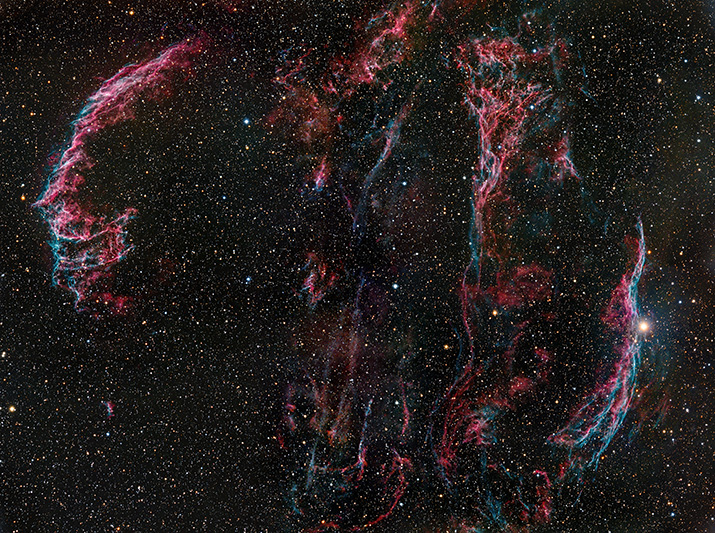
|
(4 Panel Mosaic)
Date: Aug. 22-23, 2025 Location: Dark Sky Observatory - Davis Mountains, TX |

|
The Veil Nebula is a supernova remnant in the constellation Cygnus the Swan. Distant estimates to the Veil vary. Recent studies place the Veil at ~1,500 light-years from Earth, rather than the older estimate of ~2,500 light-years[1,4], however; NASA Science attributes a distance of 2,100 light-years[3]. The Veil is the optically visible portion of a shell comprised of gas and dust known as the Cygnus Loop[1]. This large complex spans roughly the width of six full moons (about 3 degrees)[1,3]. The Veil is composed of three main visible sections: on the left (eastern) side we see the Eastern Veil; near "1 o'clock" is Pickering's Triangle; and at roughly "4 o'clock" lies the Western Veil, often called the Witch's Broom[1]. Based on current models, the progenitor star exploded between 5,000 and 8,000 years ago[2]. The supernova's peak brightness is estimated to have been around magnitude -8[1], about as bright as a crescent moon. Supernovae, like the one that created the Veil, enrich the interstellar medium with heavy elements forged in the original star's core. These materials later become part of new stars, planets, and ultimately essential components for life as we know it.
The above image is a 4-panel mosaic captured with a f/3 Officina Stellare RH200-AT astrograph and a KAF-8300 sensor. The resulting field of view spans roughly 3.4 by 2.6 degrees, or more than 6 times the width and 5 times the height of the full Moon, wide enough to encompass the expansive structure of the Veil Supernova Remenant.
References
|